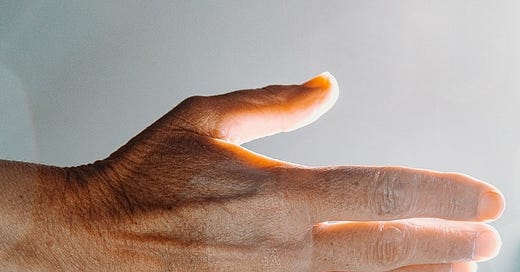Depression is as familiar to me as rain. In my commitment to support all changemakers in their vital work, to serve as my own social experiment, and to build on hundreds of hours of interviews worldwide, I have chosen to share my experience with these heavier feelings to help make space for a greater range of human experience.
In the earlier posts in this mini-series (click for Part 1 and Part 2), I looked at our darkness through the lenses of optimism, religion, mental health, psychopathy, and the social value of unhappy people. In this post, I consider whether happiness is easier for those who feel powerless to change things.
This content is hard to publish, so please like, share, and comment if it resonates! That will mean more than you know.
Is happiness a function of powerlessness?
WARNING: this post may be unsettling for addicts in recovery. I appreciate every reader who holds the Serenity Prayer dear. I merely wish to challenge how the Prayer is interpreted in the mainstream as well as to offer insight for changemakers.
Wherever ignorance is bliss, some “happy people” might habitually shut out — perhaps under the guise of “boundaries” — anything that threatens their happiness, as I have argued before. But it might be deeper than that.
Image credit: Avelino Calvar Martinez from Pixabay.
Last week, my wife celebrated 38 years of sobriety. An extraordinary feat! She is also an exceptional changemaker, and it is through her that I have reflected on both the power and the limitations of the Serenity Prayer:
"God, grant me the serenity to accept the things I cannot change, the courage to change the things I can, and the wisdom to know the difference."
This beautiful prayer is often interpreted as a justification not to worry about problems outside of our individual control. "Individual” and “control” being the operative terms.
Most content/happy people don’t understand people like me because they’ve resigned their power over the broader world and think that discontent is, thus, self-inflicted.
While I surely hope changemakers can learn to exercise our power better, if I and people like me forfeit it altogether — imperfect and fickle as it might be — we’re ALL screwed.
Even without my cynicism about control (we can’t even control ourselves), the line between control and influence is murky, and courage is rarely enough. Committed changemakers are forever expanding the scope of both their control and — where that falls short — their influence. All the good we enjoy today can be traced to individuals pursuing what they could not control through coming together, investing in their skills and access, and executing transformational plans.
If nobody ever strove to change things they can’t control, this world would be swallowed by evil.














Share this post